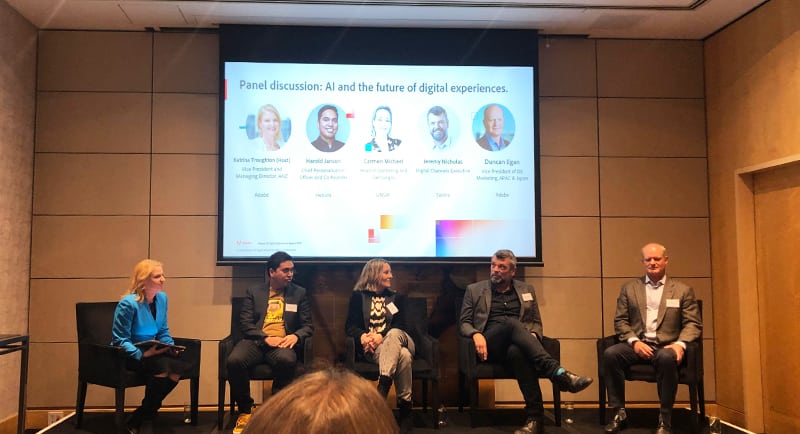Australian and New Zealand brands will lead the next wave of global customer experience innovation as consumers become aware of new technologies and more deeply explore virtual and immersive environments, according to new research from Adobe. The research has found that to help fuel this experience transformation, marketers and consumers alike are eager to embrace artificial intelligence (AI), especially generative AI.
The global survey of 13,000 consumers and 4,250 marketing and customer experience professionals outlines the broad impact of breakthrough technologies on consumers and businesses, highlighting new frontiers for living, working and shopping online.
The research was unveiled on Thursday night in Sydney’s Sofitel Wentworth, with a panel discussion from Katrina Troughton (vice president and managing director for Adobe ANZ), Harold Janson (chief personalisation officer and co-founder of Helium), Carmen Michael (head of marketing and campaigns at UNSW), Jeremy Nicholas (digital channels executive at Telstra), and Duncan Egan (vice president of adobe dx marketing APAC and Japan).

According to Adobe’s Future of Digital Experiences Report, 87% of ANZ consumers shop in physical stores today – but that percentage will drop to 66% in two years. This shift will be more prominent in the Asia Pacific (APAC) region overall, dropping to just 40%, lower than the United States, Europe, the Middle East, and Africa. Consumers expect brands to expand their digital experiences into new formats with over two-thirds (70%) of ANZ consumers wanting to view products through virtual or augmented reality, and 60% wanting to engage with brands in immersive and virtual worlds.
Today, ANZ brands are planning to respond with digital experiences such as:
• Virtual/immersive events (67%)
• The ability to build virtual products and convert them into physical items (67%)
• VIP access to virtual influencers and celebrities (65%)
• Offering digital tokens to trade for virtual and physical products (63%)
Expectations rise in the current climate
While the future is exciting, the current economic environment pressures brands to up-level their customer experiences: Almost half (44%) of ANZ consumers say their expectations are heightened by a worsening economic climate. This is particularly true for ANZ Gen Z and Millennials, where 50% say their expectations are higher in a down economy. ANZ consumers also place an outsized premium on trust and price in a challenging economy.
“Consumers across Australia and New Zealand have high expectations for brands, and this is only increasing as economic challenges grow in the region,” said Troughton. “Marketers already recognise the potential of artificial intelligence. The next step is to invest in such emerging technologies and apply it across all CX workflows to accelerate the delivery of personalised experiences.”
Brands and consumers see Generative AI’s potential
As expectations escalate, ANZ marketing and customer experience professionals are already relying on artificial intelligence: Almost half (46%) say AI is helpful in their work, with 12% calling AI “a miracle”. Marketing and customer experience professionals are even more optimistic regarding emerging generative AI technologies – eight out of ten respondents anticipate generative AI will help increase their work product quality and volume (85%), enhance their creativity (82%), and help reach more of the right customers (85%). Strong majorities also believe generative AI will help better personalise customer experiences (85%), as well as identifying new audiences and customer journeys (88%).
ANZ consumers also recognise the potential for generative AI to transform their brand interactions. Almost two thirds (63%) say it will enhance the customer experience; 66% believe it can improve product quality. Consumers are excited for brands to use generative AI, as long as they do so responsibly. When asked how a company should use generative, 37% prioritized ethical considerations, while 47% prioritized actions that would improve their customer and employee experiences. Only 16% said companies should not use generative AI at all.
APAC consumers at forefront of demand for new digital experiences
The Adobe research reveals diverse perspectives across the range of APAC countries. Consumers and marketers in India, Malaysia, Singapore, and Thailand are generally more active in embracing new digital experience formats, environments, and tools than in Australia, New Zealand and Japan.
This includes 81% of consumers in India, 70% in Malaysia and 66% in Singapore, who expect more personalised and relevant digital experiences, given the data and technologies brands can access. These numbers significantly contrast with 32% of consumers in Australia and New Zealand, and just 13% in Japan.
These numbers parallel national consumer expectations that brands will offer new and innovative experiences. For example, 91% of Indian consumers, 87% in Singapore and Thailand and 83% in Malaysia expect new ways for brands to engage in virtual or immersive worlds. The same is true for 62% of Australians and 59% of New Zealanders, compared with just 48% in Japan.
Similar variations are seen when it comes to the perceived potential of generative AI to enhance customer experiences or products. In Thailand (94%) and India (93%), over nine in ten consumers believe generative AI can improve customer experiences and product quality – in Australia and New Zealand, the numbers are in the six in ten range (60% and 67% respectively).
See Also: Adobe announces major innovations across firefly gen AI capabilities in Adobe Illustrator
